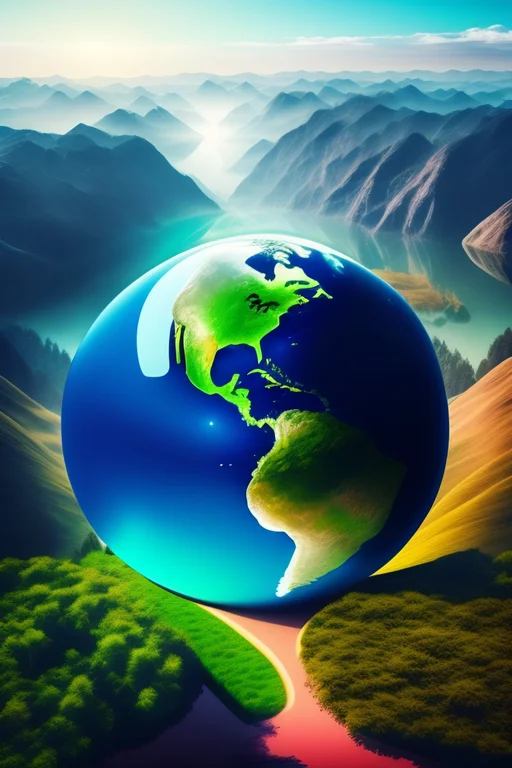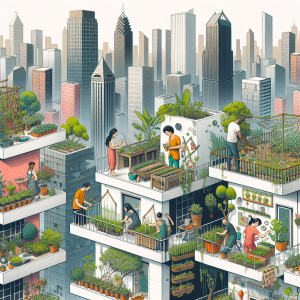Why are Natural Resources Important: Introduction
Let’s travel down memory lane and dive deeply into the question; “Why are natural resources important?” Remember your first childhood love? How your heart fluttered when they looked your way, the giddy excitement at the prospect of holding hands at recess, the nerves whenever you worked up the courage to share your cookies at lunch. These might be the delightful joys of innocent love, but they aren’t so different from the relationship we, humans, share with our planet, Earth.
Yes, you heard right! Earth is essentially that childhood sweetheart we all deeply cherish, care for, and can’t imagine life without. If we break it down, it’s really a rather poetic romance. The way the wind whispers in our ears, how the sun beams down on us with warm smiles, the reassuring embrace of the ground under our feet – it’s a love story for the ages!
In this equation, our natural resources are the candy hearts we exchanged at school or the love letters passed under the desk, the tokens of affection that express how much we need and appreciate each other. They are not only essential to our survival but also for the beautiful, thriving planet we call home. It’s these natural resources we will explore, like opening a timeless love letter, unfolding its depths, and understanding its profound importance.
The Nitty Gritty of Natural Resources
Definition and Examples
In the spirit of romancing the Earth, let’s get to know our love letters a little better. So, what exactly are these candy hearts we’re so smitten with? Natural resources, in the simplest of terms, are the gifts that nature bestows upon us. They are the materials or substances occurring in nature which can be exploited for economic gain or used to enhance the quality of life.
For example, let’s consider water, a natural resource we might take for granted but is as essential as the air we breathe. From quenching our thirst to watering our crops and running our industries, water is the unsung hero of natural resources. Similarly, we have fertile land that shelters and nourishes an array of life forms and gives us our daily bread.
On the other hand, we have resources like minerals – the bling in Earth’s treasure chest. They help us build our homes, drive our vehicles, and even power our phones! Diamonds, gold, copper, coal – these are the shiny trinkets we’ve been admiring, using, and cherishing since the dawn of civilization.
The Types and Their Importance
Natural resources come in two main flavors: renewable and non-renewable. Renewable resources, like the sunlight that warms our skin, the wind that cools on a hot day, and the timber that builds our homes, are resources that can replenish themselves if used wisely. Just like the love notes that keep coming as long as the affection is there.
Non-renewable resources, however, are like the finite number of candies in the box. These include resources like coal, oil, and natural gas that take millions of years to form. Once consumed, they’re gone, leaving us with an empty candy box and a sense of longing.
These resources are not just pretty to look at or fun to play with; they play a crucial role in our lives. They power our world, feed our populations, and provide the raw materials for goods and infrastructure. It’s like a plate of nachos at a party; you don’t realize how crucial they are until they’re gone, and suddenly the party isn’t as fun anymore. Hence, understanding their value and learning to manage them effectively is as important as the survival of our love story with Mother Earth.
Why are Natural Resources Important: The Vital Role
Natural resources play such a crucial role in our lives that it’s impossible to overstate their importance. They’re like that best friend who always has your back, making life a lot easier and a lot more fun. Let’s look at the roles they play.
Economic Significance
From an economic perspective, natural resources are the foundation on which societies build wealth and prosperity, kind of like a universal gold mine. They form the basis for most industries, from agriculture and manufacturing to energy and tourism. Imagine trying to bake a cake without flour or eggs. Sounds impossible, right? That’s exactly what running an economy would be like without natural resources.
For instance, oil, a non-renewable resource, fuels not only our cars but also our economies. It’s used in a range of industries from plastics to pharmaceuticals, impacting everything from the price of a gallon of gas to the cost of your toothbrush. On the other hand, resources like fertile soil and freshwater are the lifeblood of agriculture, a sector that employs billions worldwide and fills our dinner tables every night. It’s like setting up a buffet, where natural resources are the dishes everyone craves.
Social Importance
Socially, natural resources are fundamental to the functioning of our communities and our daily lives. They’re like the very air we breathe – invisible, often taken for granted, but absolutely essential. They provide us with food to nourish our bodies, materials for shelter and clothing, and energy to heat our homes and power our technology.
Picture your typical day – waking up in a house made of wood or concrete, having breakfast grown on fertile soil, driving a car powered by gasoline to a job that, in one way or another, depends on the use of natural resources. Even the device you’re using to read this article owes its existence to several natural resources! Like a series of dominos, if one piece falls, the entire line is affected.
Ecological Importance
Ecologically, natural resources help maintain a delicate balance that makes Planet Earth a livable ‘home sweet home’ for millions of species, including us. They’re like the maestro of a grand orchestra, keeping all the elements in harmony.
Forests, for instance, are not just providers of timber. They are biodiversity hotspots, natural water filters, carbon sinks, and play a vital role in regulating the Earth’s climate. Remove them, and it’s akin to taking out the conductor mid-performance – the harmony goes out of the window!
Why are Natural Resources Important: Overexploitation
Love is a splendid thing until it turns into obsession. The same goes for our utilization of natural resources. Overexploitation, or using these resources at a pace faster than they can regenerate, is like an uncontrolled infatuation that could lead to dire consequences.
Causes of Overexploitation
The main culprits of overexploitation include rapid population growth, excessive consumption, technological advancements, and wastage. It’s like being at an all-you-can-eat buffet and trying to eat all the food at once. Sounds ridiculous, right? But that’s exactly what we’re doing to our planet.
Consequences of Overexploitation
As for the consequences, overexploitation is a recipe for environmental, social, and economic disaster. Environmental impacts include habitat loss, biodiversity decline, and pollution, while economic consequences can range from resource scarcity and price hikes to the collapse of industries reliant on these resources.
Think of it as waking up one day to find your house turned into a pineapple under the sea. Except, it’s not as fun as SpongeBob makes it seem. Instead, it’s a world where clean air is a luxury, water wars are common, and animal species exist only in virtual zoos. A sobering thought, isn’t it?
Why are Natural Resources Important: Conservation
So, we’ve woken up to the fact that our overzealous love for natural resources might be more of a destructive obsession. What next? This is where conservation comes in. Like a heartfelt apology letter, it’s our way of mending the relationship, of saying, “Hey, we realize we messed up, but we want to make things right.”
What is Conservation?
Conservation is the careful management and preservation of natural resources to prevent depletion, maintain biodiversity, and ensure sustainable use. It’s like using your box of chocolates wisely, ensuring that you have enough to satisfy your sweet tooth without running out too soon. And also making sure that you’re not the only one enjoying the chocolates but leaving some for others as well.
Methods of Conservation
Conservation methods range from sustainable practices and recycling to legal protections and education. In the realm of renewable resources, it’s about using wind, solar, and hydro energy more, thereby reducing our dependence on coal and oil. For biodiversity, it could mean setting up wildlife reserves and national parks, protecting endangered species, or reforesting areas affected by deforestation.
It’s like organizing a neighborhood clean-up. We can individually ensure our homes and gardens are clean, but to keep the neighborhood tidy, we need everyone to chip in. That’s precisely what conservation does; it calls upon everyone – individuals, businesses, and governments – to do their part.
How Can You Contribute to the Conservation of Natural Resources?
Recycle and Reuse
Recycling isn’t just a trendy catchphrase; it’s a crucial part of resource conservation. By recycling items like paper, plastic, glass, and metal, you’re contributing to a circular economy, reducing the need to extract and process raw materials. This also minimizes energy consumption and emissions in manufacturing. Moreover, when you opt for recycled products, you encourage a larger market for them, further closing the recycling loop. Reusing items also saves on resources. Think twice before throwing out old furniture or clothing—perhaps they can be upcycled or donated instead of ending up in a landfill.
Energy Efficiency
Energy conservation is about smarter energy use. Turning off lights, fans, or other appliances when not in use is the first step. Investing in energy-efficient appliances—like ENERGY STAR-rated devices—can save both electricity and money. Consider programmable thermostats, LED lighting, and energy-efficient water heaters. For those who can afford it, installing solar panels or wind turbines at home can significantly reduce reliance on non-renewable energy sources, making your home more sustainable in the long run.
Water Conservation
Water is a finite resource that is increasingly under stress due to climate change and overuse. Simple acts like fixing leaking faucets promptly can save gallons of water over time. Don’t leave the tap running while brushing your teeth or washing dishes. Opt for water-efficient fixtures like low-flow toilets and showerheads. Watering your garden early in the morning or late in the evening minimizes evaporation, making the most of every drop. Collecting rainwater for outdoor use is another excellent way to conserve.
Sustainable Transportation
Transportation is one of the leading sources of greenhouse gas emissions. By walking, cycling, or using public transport, you can significantly reduce your carbon footprint. Carpooling is another excellent option for those who can’t avoid driving. If you need to own a vehicle, opt for fuel-efficient or electric models. Using public transportation not only reduces individual carbon footprints but also lowers traffic congestion and the associated pollution.
Promote Biodiversity
Biodiversity is essential for ecosystem resilience and health. Planting local and indigenous species in your garden supports local wildlife by providing natural habitats. This practice also usually requires less water and care than exotic plants not suited for your climate. If possible, create a compost pile to recycle food waste, which not only enriches your soil but also reduces the amount of organic waste going into landfills. By promoting biodiversity, you contribute to the larger ecosystem, benefiting both local wildlife and the community.
Taking an active role in conserving natural resources doesn’t require drastic lifestyle changes. Small, consistent actions can have a significant cumulative effect, making each one of us a steward of the Earth’s future.
Why are Natural Resources Important: Conclusion
In our love story with Earth, natural resources are the bonds that hold us together, the sweet nothings we exchange that make life worth living. We’ve seen how crucial they are to our existence, providing the bedrock for our economies, the framework for our societies, and the lifeblood of our ecosystems.
However, this love affair isn’t all sunshine and rainbows. We’ve seen how our insatiable appetite for these resources could lead to a disastrous breakup, with overexploitation driving environmental degradation, economic instability, and societal unrest.
But all hope is not lost. Just like the sun that peeks through the clouds after a storm, there’s a silver lining. With conservation, we have a chance to mend our ways, to transform our destructive obsession into a sustainable love affair.
So, what’s the moral of the story? Well, it’s simple. Our natural resources are important – they’re precious gifts that need to be cherished and preserved. So, let’s ensure we treat them with the respect and care they deserve, because, without them, our love story with Earth might not have a happy ending.
FAQs
Why are natural resources important?
Natural resources, our planet’s bounty, play a multifaceted role in our lives. Economically, they provide raw materials for various industries, helping create jobs, generate income, and contribute to a country’s Gross Domestic Product (GDP). For instance, oil is a significant driver of the global economy, utilized in various sectors, from energy to plastics.
From a societal perspective, natural resources meet our basic and advanced needs. They give us food, water, shelter, clothing, and much more. For example, agricultural activities rely on fertile soil and freshwater to produce the food that sustains us.
Ecologically, natural resources contribute to maintaining the Earth’s balance. They aid in climate regulation, house diverse species, and offer ecosystem services like water purification, nutrient cycling, and pollination. Forests, for example, are crucial for absorbing carbon dioxide, thus helping mitigate climate change.
How does the overexploitation of natural resources affect us?
Overexploitation of natural resources is akin to shooting ourselves in the foot. Environmentally, overexploitation leads to a decrease in biodiversity, habitat destruction, and increased pollution. When we overfish, for example, we disrupt marine ecosystems, leading to the extinction of fish species and the collapse of the fisheries industry.
Economically, overexploitation can lead to resource scarcity, which, in turn, causes prices to skyrocket and industries to falter. An example is the infamous 1973 oil crisis when over-reliance and heightened demand for oil led to an energy crisis and global economic downturn.
Socially, overexploitation can exacerbate inequality and cause social unrest. When water becomes scarce due to overuse, it’s often the marginalized communities that bear the brunt, leading to what is often referred to as “water wars.
What is the role of conservation in the sustainable use of natural resources?
Conservation acts as a bridge to sustainability, ensuring that we utilize our resources in a manner that meets our current needs without compromising future generations’ ability to meet theirs.
It involves practices like sustainable farming, which reduces soil erosion, enhances soil fertility, and improves crop yield. Renewable energy technologies like wind turbines, solar panels, and hydropower plants help conserve non-renewable resources like coal and oil while curbing greenhouse gas emissions.
Moreover, conservation initiatives like setting up protected areas, implementing wildlife laws, and promoting reforestation help maintain biodiversity and healthy ecosystems.
What happens if we do not conserve our natural resources?
Ignoring conservation could spell catastrophe for all life forms. Non-renewable resources like oil and minerals would be depleted, causing massive disruption in industries that depend on them. Fertile soils could become barren wastelands due to over-farming, leading to food shortages.
Freshwater bodies could dry up or become polluted, making clean water a scarce commodity. Rapid deforestation could accelerate climate change and cause widespread species extinction. In short, failing to conserve our natural resources could precipitate a global crisis, disrupting the intricate balance of life on our planet.




